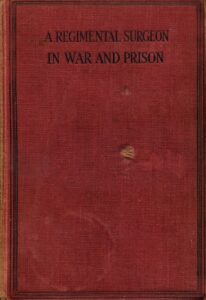 Robert V. Dolbey, MB, MS (Lon) FRCS (Eng). A Regimental Surgeon in War and Prison, John Murray, London (1917)
Robert V. Dolbey, MB, MS (Lon) FRCS (Eng). A Regimental Surgeon in War and Prison, John Murray, London (1917)
Capt Robert Dolbey, RAMC. recounts the wandering of a regimental medical officer during the Battle of the Marne and fighting at La Bassee and as a German prisoner. The book provides excellent insight on the regimental medical and exacuation system during the Great War.
 The Sling No2. A Little Journal Published by the Boys of a Canadian Field Ambulance on Active Service (1917)
The Sling No2. A Little Journal Published by the Boys of a Canadian Field Ambulance on Active Service (1917)
The publiation is an example of the many “trench journals” published during WWI.
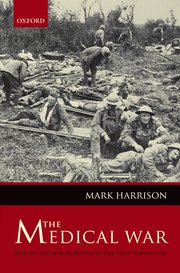 Mark Harrison, The Medical War: British Military Medicine in the First World War
Mark Harrison, The Medical War: British Military Medicine in the First World War
The first book on medicine in the First World War to provide wide-ranging geographical and thematic coverage of medicine. Considers the British Army’s medical responsibilities for non-British troops and labourers, principally those of the Indian Army and various colonial labour detachments. Parallel study of the author’s award-winning study of British military medicine in the Second World War (Templer Medal Book Prize, 2005)
 J. George Adami, War Story of the Canadian Army Canadian Medical Corps 1914-1915,
J. George Adami, War Story of the Canadian Army Canadian Medical Corps 1914-1915,
George Adami, MD, FRS, (Temporary Colonel C.A.M.C.) A.D.M.S. was in Charge of Records, Office of Director-General, Medical Services, O.M.F.C. It can be read online by clicking here or here
Colonel A.E. Snell, The CAMC with the Canadian Corps During the Last Hundred Days of the Great War 
The book provides a good overview of the problems of the medical services in war, of the methods by which the sick and wounded are cared for, and of the devotion and intelengence with which the duties od all ranks were discharged. Col Snell was Deputy Director Medical Services, Canadian Army Corps. King’s Printer, Ottawa, 1924
Sir Andrew MacPhail, The Medical Services,  King’s Printer, Ottawa, 1925
King’s Printer, Ottawa, 1925
This is the official of the Canadian military service in the Great War 1914 -1918. Sir Andrew MacPhail was Professor of the History of Medicine at McGill University.
Colonel Herbert A. Bruce, Politics and the Canadian Army Medical Corps, William Briggs, Toronto, 1919. 
A history of intrigue containing many facts omitted from the official records showing how efforts at rehabilitation were baulked. It can be read online by clicking here
 Guide to Sources Relating to Units of the Canadian Expeditionary Force – Canadian Army Medical Corps, Library and Archives Canada
Guide to Sources Relating to Units of the Canadian Expeditionary Force – Canadian Army Medical Corps, Library and Archives Canada
Included are field ambulance units, casualty clearing stations, general hospitals, stationery hospitals, special hospitals, convalescent hospitals, sanitary sections, mobile laboratories and hospital ships.
 Canadian Medical Unit War Diaries
Canadian Medical Unit War Diaries
The Canadian Great War Project has compiled a list of Canadian medical unit war diaries. Click here to view list of units.
Royal Canadian Navy Medical Service During WWI,  (Excerpt from the book History of the Canadian Forces–the Medical Services by Sir Andrew Macphail)
(Excerpt from the book History of the Canadian Forces–the Medical Services by Sir Andrew Macphail)
John Webber, Lt (N) Retd. First Aid: Nurses in the RCN, WWI, CFB Esquimalt Naval & Military Museum
Canadian physicians, surgeons and medicine in the First World War: Resource List
This resource list was created as a joint venture by the Canadian Medical association, the College of Family Physicians of Canada and the Royal College of Physicians and Surgeons of Canada to mark the centenary of the first World War to recognize the contributions of Canadian physicians and surgeons to the war effort. The resource list is intended as an aid to researchers interested in thee relationships between medicine, surgery and war. Click here to view
“Help Us, Serve England”: First World War Military Nursing and National Identities, Cynthia Toman, Canadian Bulletin of Medical History/Volume 30:1 2013/p. 143-166
Canadian Bulletin of Medical History/Volume 30:1 2013/p. 143-166
This article explores the working relationships of Canadian Nursing Sister Emeline Robinson (photograph) with British nurses, Volunteer Aid Detachment (VAD) volunteers, orderlies, and medical officers during her one and a half years with the Queen Alexandra Imperial Military Nursing Service Reserve through her diary, which spans her enlistment, resignation, and re-enlistment with the Canadian Army Medical Corps.
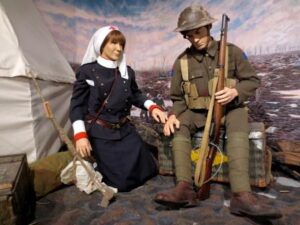 Harold A. Skaarup, Nursing Sisters, Canada
Harold A. Skaarup, Nursing Sisters, Canada
That at the beginning of the Great War of 1914-18 there were five Permanent Force nurses and 57 listed in reserves. By 1917, the Canadian Army Nursing Service included 2,030 nurses (1,886 overseas) with 203 on reserve. In total, 3,141 Canadian nurses volunteered their services. Because of their blue dresses and white veils they were nicknamed the “Bluebirds”. Click here to learn more about Canada’s Nursing Sisters
Photograph: Canadian Nursing Sister ministering to a soldier in the Great War (1914-1918), diorama the New Brunswick Military History Museum, CFB Gagetown, New Brunswick.
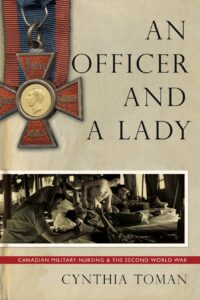 Cynthia Toman, An Officer and a Lady: Canadian Military Nursing and the Second World War, UBC Press Vancouver . Toronto, 2007
Cynthia Toman, An Officer and a Lady: Canadian Military Nursing and the Second World War, UBC Press Vancouver . Toronto, 2007
During the Second World War, more than 4,000 civilian nurses enlisted as Nursing Sisters, a specially created all-female officers’ rank of the Canadian Armed Forces. They served in all three armed force branches and all the major theatres of war, yet nursing as a form of war work has long been under-explored. An Officer and a Lady fills that gap. Cynthia Toman analyzes how gender, war, and medical technology intersected to create a legitimate role for women in the masculine environment of the military and explores the incongruous expectations placed on military nurses as “officers and ladies.”
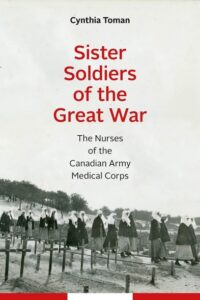 Cynthia Toman. Sister Soldiers of the Great War: The Nurses of the Canadian Army Medical Corps. Vancouver: University of British Columbia Press, 2016. Pp. 312.
Cynthia Toman. Sister Soldiers of the Great War: The Nurses of the Canadian Army Medical Corps. Vancouver: University of British Columbia Press, 2016. Pp. 312.
 WW1 Nursing Sisters of Old Durham County
WW1 Nursing Sisters of Old Durham County
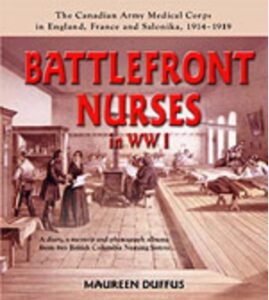 Maureen Duffus, Battlefront Nurse in WW I,
Maureen Duffus, Battlefront Nurse in WW I,  Victoria, BC, 2009
Victoria, BC, 2009
The story of four years in the lives of two nursing sisters who enlisted in the Canadian Expeditionary Force in Esquimalt, British Columbia, in the summer of 1915. Both served overseas in England, Salonika and France as Lieutenants with the Canadian Army Medical Corps.
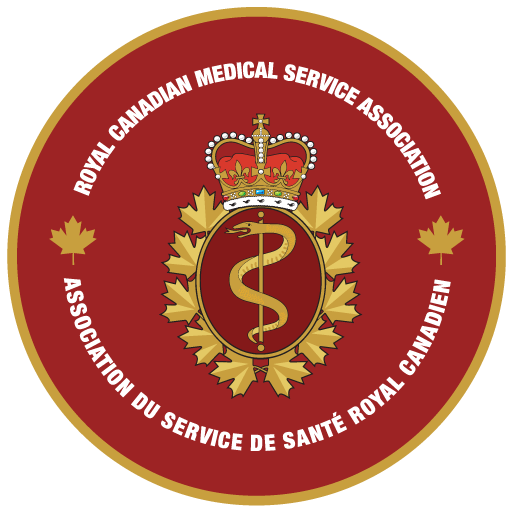
Recent Comments